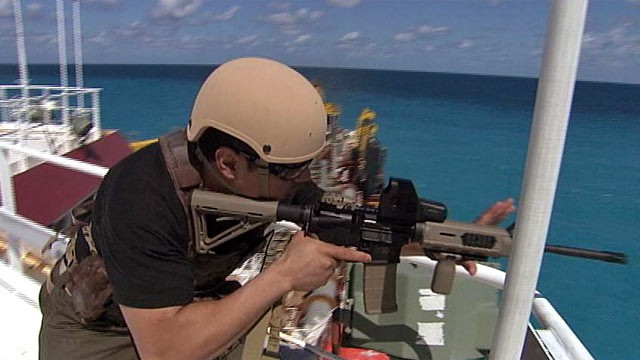
September 2012
As the threat of piracy in international water peaking in 2011, incidents have recently fallen off. International naval task forces have had a lot to do with it, but so have private security firms that shipping companies have been hiring to personally secure their ships.
International shippers spend nearly $1 billion USD securing their ships with private armed guards. Such spending was not common at all before the pirate epidemic, which started in 2008. According to Oceans Beyond Piracy, an international piracy watchdog organization, around half of all merchant vessels that cross the Indian Ocean now employe private security contractors.
Many companies have jumped into the waters, so to speak, making a nice profit while securing the profits and human capital of international shipping companies. While there is evidence that some pirates have attempted to hijack a commercial vessel with armed guards aboard, there has not been one successful attack on such a vessel.
Pirates have become quite skilled at overtaking unprotected vessels, however. The slow speed and low-to-the water rails of cargo ships makes them essentially sitting ducks. A sparse and unarmed crew is an easy mark for intimidation by the criminals, who have begun outfitting themselves with rocket-propelled grenades and assault rifles. Of course, pirates are (for now) less adept at assaulting a ship that is properly defended and returning fire.
This is likely to change, however, as pirate organizations adapt to changing circumstances. Part of the problem is that nobody is familiar with how these organizations operate, recruit and obtain capital. Essentially, there’s no telling what they may be capable of. Some pirates are beginning to employ upwards of a dozen skiffs, all loaded with RPG’s and assault rifles.
While Somali pirates have never successfully hijacked a ship employing armed guards, that doesn’t mean they won’t try. At this point, if only half of the merchant vessels are employing armed guards, why would pirates go out of their way to select a well-defended target? Once armed-guards become the status quo, however, they will likely be challenged with more vigor.
With the increase in private-security contractors comes an increase in questions of regulation. There are no defined international rules as far as the engaging enemy combatants who may be pirates, which means the decision is often left up to the contractors on board. There have been no serious incidents involving private-security contractors firing upon innocent people, but several military vessels have committed such acts.
Additionally, there are no guidelines to establish reporting of rebuffed pirate attacks. Such information would be valuable in assessing the landscape of maritime security in the Indian Ocean, but the shipping companies themselves may have reason to withhold that information. Even attempted hijackings can cause insurance premiums to skyrocket, and scare away potential business partners or employees.
With the influx of nearly 7,000 weapons into the area, some international regulation will be needed, lest this stretch of ocean become the wild-west of the sea. While the U.S. State Department endorses the use of armed-guards aboard ships, they are reluctant to give the industry their full blessing without closely examining the situation.